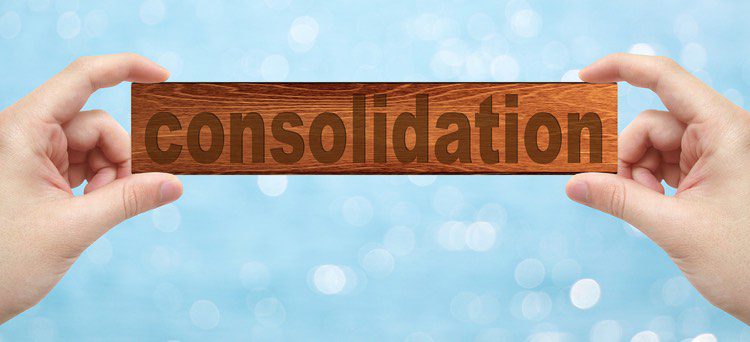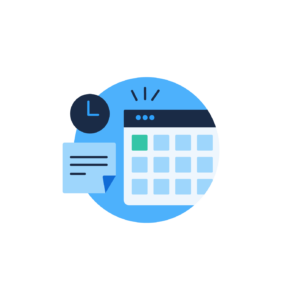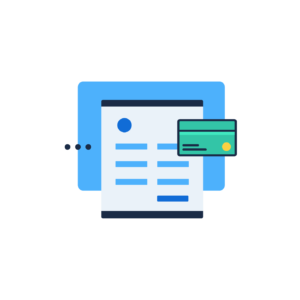If you’re looking into debt consolidation, then you’re probably at the point in the debt cycle where you realize you might be trying to juggle too much debt. You may still be on time with payments, but your high interest rates are setting you back or you have too many accounts, making it hard to keep up with. Maybe you can’t afford to do more than the minimum payment, so you’re likely not getting anywhere with your debt. The good news is that there are some things you can do to get closer to your financial goals.
We cover the details of debt consolidation throughout this site, and in videos about consolidating debt on our YouTube channel, with this particular page being set up to reference as a resource. So… I will start with defining what it is we are talking about with debt consolidation (because the term is used so freely to describe multiple different approaches).
What is debt consolidation?

The term, “consolidation”, means to “…combine a number of things into a single, more effective whole”. This is true when speaking about your debt, however, this term is used to describe a few, very different, solutions in the debt and credit industry.
Bill Consolidation (i.e. Credit Counseling)
Consolidation commonly refers to Credit Counseling, where you may be signed up for a Debt Management Plan, or DMP. Less than one third of those seeking credit counseling will enter into a DMP. This is where a credit counselor negotiates small concessions (lower interest rates, penalties, etc.) with your creditors, and consolidates your bills into one monthly payment. The counselor then takes that monthly payment and disperses it to your creditors, all the while offering additional money management tools and options.
Please see our simple guide to Credit Counseling Services.
It’s important to be transparent about your finances, so you can get what you need from your counselor. If he or she doesn’t understand where you are, financially speaking, then it makes it harder for them to effectively assist you in getting out of debt, and isn’t that your primary goal?
For a free one-on-one consultation with a good and reputable credit counseling agency, call 1-800-939-8357, and choose option 1.
I mentioned that it’s typical that only 1 in 3 people can qualify for the reduced monthly payments from consolidating your credit cards and other bills through a nonprofit counseling agency. It is a call worth making because it’s free to get an exact, to-the-penny consolidation quote. They aren’t pushy, and you can quickly learn if it’s something that can work for you or not.
The advantages of credit counseling and a DMP:
- you will learn how to budget your money
- different types of bills can be included in your DMP (credit card debt, household bills, loans, medical, etc.)
- your counselor will help you to see your finances clearly
- if you’re signed up for a DMP and stick to it, you will be debt free in under 60 months
- they will discuss other options with you if they feel it is viable
- your counselor will work with you to come up with a plan to meet your goals
- There is little to no impact to your credit scores
Credit counseling services have a lot of resources and tools available to help you assess your financial situation and design a plan to get out of debt. This makes them an ideal choice for someone who feels their finances are beginning to close in around them. If you’re uncertain, see how credit counseling stacks up against debt settlement.
Consolidating Debts with a Loan
Debt consolidation often refers to taking out one large loan, with a lower interest rate, to pay off other, smaller debts – credit cards or other accounts. This could be done through peer to peer lending and many other types of personal loans, or as a secured loan (HELOC). Secured loans will often give you the lowest interest rates.
Please read our detailed post on Consolidation Loans.
This method of consolidating is great if:
- you can still qualify for a good interest rate on a loan
- you find that it’s getting hard to manage multiple loans
- you’re not yet behind on any of your accounts
The downside of this type of consolidation is that if you become delinquent, you’ll be accumulating fees, hurting your credit score, and possibly losing that low interest rate before you get a chance to reap the benefits.
It’s important to note that if you need to apply for a new loan to pay off your higher interest credit cards with, the fact that you’re in debt with higher credit card utilization will count against you in your application. Your current credit score will often impact the interest rate you pay on a peer to peer, or other loan.
Another thing to consider is that consolidating your credit cards by paying them off with money you get from a HELOC means you have traded unsecured debt for a secured loan, and that can put your home at risk if you later fall into a hardship.
Credit Card Balance Transfers
This is also a form of debt consolidation because you can transfer one, or several, smaller credit card balances with higher interest rates to a credit card with a larger limit and a lower interest rate – preferably a 0% introductory rate offer. This helps you save the most money in this “window” of time. A balance transfer is also more convenient, as you are able to make just a single payment per month.
Read this this post to avoid the Balance Transfer Boogey
Things to think about before transferring your credit card debt:
- the introductory rate will end so make sure you can make progress on your debt in the allotted time
- make sure you qualify for the credit card you want and that the credit limit is large enough to more-than-cover (see below) the debt you want to transfer
- understand credit utilization to maintain your credit score – what you’re transferring should only use about 30% of your new higher credit limit to be optimal (the more accounts and higher debt you have, the more impossible this becomes)
- you’ll be charged balance transfer fees, so be sure you’ve done the math and know that the transfer balance will be worth it in the end
- once you get out of debt, avoid it like the plague – don’t use those old credit cards again
- if you pay late, even once, you may lose out on your shiny 0% intro rate
As you can see, the phrase “debt consolidation” covers a lot of ground. Make sure you understand the differences between each type of consolidation before deciding which one will work best for your specific set of circumstances. This will better ensure your financial success in the long run.
Other consolidation resources and questions:
- Get Out of Debt Quicker with Debt Roll-up
- How long does credit counseling stay on my credit report?
- Hardship Payment Plans for Credit Card Debt
- What Does Credit Counseling and a DMP Do to My Credit Score?
- Debt is a Bully with a Big Stick
Please also use our search bar in the sidebar to the right to help you find the content you’re looking for. If you have questions about consolidating debt in your specific situation, post in the comments below for feedback.



Leave a Reply